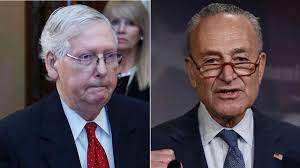
Senate Minority Leader Mitch McConnell (R-Ky.) on Monday demanded that Senate Majority Leader Charles Schumer (D-N.Y.) and House Speaker Nancy Pelosi (D-Calif.) de-link a bipartisan infrastructure deal from a sweeping Democratic-only bill.
McConnell’s statement is the first he’s made since President Biden walked back his pledge that he wouldn’t sign the bipartisan deal if it was the only thing that came to his desk, saying over the weekend that the veto threat wasn’t his “intent.”
But McConnell, in his statement, argued that without a similar de-linking of the two parts of the Democratic infrastructure plan by congressional leadership that Biden’s remarks would be a “hollow gesture,” in the latest sign that the bipartisan deal isn’t yet back on firm footing.
“Unless Leader Schumer and Speaker Pelosi walk-back their threats that they will refuse to send the president a bipartisan infrastructure bill unless they also separately pass trillions of dollars for unrelated tax hikes, wasteful spending, and Green New Deal socialism, then President Biden’s walk-back of his veto threat would be a hollow gesture,” McConnell said in a statement.
“The President cannot let congressional Democrats hold a bipartisan bill hostage over a separate and partisan process,” he added.
McConnell’s rhetoric was immediately picked up by other Republicans, who are hoping to squeeze Democrats on their infrastructure strategy.
“Joe Biden reversed his threat to veto a bipartisan infrastructure bill if it isn’t accompanied by a $6 trillion socialist boondoggle. Will Speaker Pelosi do the same?” the National Republican Campaign Committee, the House GOP’s campaign arm, asked in an email blast to reporters on Monday.
Democrats are pursuing a two-track infrastructure plan: On one track is the bipartisan deal that would cost approximately $1.2 trillion over eight years with more than $570 billion in new spending.
On the second track is a sweeping multitrillion-dollar bill that Democrats plan to use under reconciliation, which allows them to bypass the 60-vote legislative filibuster. To unlock that option, Democrats will need all 50 members of their Senate caucus united so they can move without Republicans.
McConnell said during a separate press conference on Monday that there was “bipartisan support for a significant infrastructure package” and that he would “like to see us get there” but Democratic leaders had to agree to de-link the two plans.
“I appreciate the president saying that he’s willing to deal with infrastructure separately but he doesn’t control the Congress. And the speaker and the majority leader of the Senate will determine the order,” McConnell said.
McConnell, pointing back to negotiations Biden had with Republican senators, added that “there was no agreement” that the bipartisan plan be linked to a Democratic-only bill.
Schumer has said the Senate will vote on the bipartisan bill and a budget resolution that greenlights and includes the instructions for a second, larger Democratic-only bill in July. The Senate would still need to pass the sweeping multitrillion-dollar bill, which could get pushed into the fall.
Budget Committee Democrats are expected to talk on the phone this week as they try to hash out the details of the budget resolution, according to Sen. Tim Kaine (D-Va.), a member of the panel.
Under pressure from progressives — who worry their priorities like climate change and expanding Medicare will get left behind if the two tracks are uncoupled — Pelosi vowed that she will not move a bipartisan bill until the Senate passes the more sweeping plan.
“Let me be really clear on this: We will not take up a bill in the House until the Senate passes the bipartisan bill and a reconciliation bill. If there is no bipartisan bill, then we’ll just go when the Senate passes a reconciliation bill,” Pelosi said late last week.
A spokesman clarified that she was talking about the Democratic infrastructure plan itself and not just the budget resolution.
Republicans involved in the bipartisan negotiations signaled over the weekend that they were accepting Biden’s walk back.
Sen. Rob Portman (R-Ohio) said on Sunday that he was “blindsided” by Biden’s comments but added that he was “very glad to see the president clarify his remarks because it was inconsistent with everything that we had been told all along the way.”
But other Republicans involved in the larger gang of 21 senators, who put out a statement endorsing the deal, have suggested they want commitments from Sens. Joe Manchin (D-W.Va.) and Kyrsten Sinema (D-Ariz.) that the bipartisan deal and the reconciliation bill won’t be linked.
And McConnell, in his statement, urged Biden to try to get a similar commitment from Democratic leaders.
“The President has appropriately delinked a potential bipartisan infrastructure bill from the massive, unrelated tax-and-spend plans that Democrats want to pursue on a partisan basis. Now I am calling on President Biden to engage Leader Schumer and Speaker Pelosi and make sure they follow his lead,” McConnell said.
Some Senate Democrats immediately panned McConnell’s remarks.
“McConnell having a hard time coming to terms with the fact he’s not the Majority Leader anymore,” Sen. Chris Murphy (D-Conn.) tweeted.
“It’s a real shame we couldn’t pass everything in the bipartisan deal with 50 votes under reconciliation. So frustrating we have no process to allow us to pass this without Republicans if their demands become too unreasonable. No…wait a minute,” he added in a subsequent tweet.
Kaine also acknowledged that McConnell, after describing himself in listening mode, could come out against an infrastructure bill.
“It’s not unlike him to sometimes pull the football out when the kicker is just about to kick it. I’ve seen him do that before,” Kaine said.
Via The Hill


